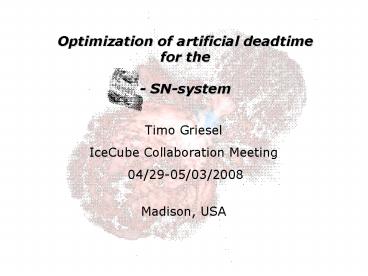Folie 1 - PowerPoint PPT Presentation
1 / 13
Title: Folie 1
1
Optimization of artificial deadtime for the -
SN-system
Timo Griesel IceCube Collaboration Meeting
04/29-05/03/2008 Madison, USA
2
Correlated Noise
__________________________________________________
__________________________________________________
Time between two hits DOM 754dad1d3800 (Str49-1)
Ideal poissonian noise
Correlated noise, Afterpulses
Shown fit
Page 1/12
3
Afterpulse origin of the correlated noise
__________________________________________________
__________________________________________________
- Causes
- Afterpulses in the PM
- ltµs
- Scintillations due to radioactive decays in
the glas sphere (238U, 232Th ) ms
Suppression of afterpulses due to artificial
deadtime
Hellwig et al. AMANDA-IR/20010301
Hellbing et. al. AMANDA-IR/20030701
O. Franzen Diploma thesis 2003
N. Sido Martin Diploma thesis 2003
Page 2/12
4
The data
__________________________________________________
__________________________________________________
Last Pole season Omicron ATWD hits data was taken
(02/06/2008) by John J. and T.Griesel with the
help of K.Hanson.
Data Format Raw ATWD hits Position String 39,
String 49 all DOMs Duration 15min Data Size
2GB Contains GMT Values
I3deadtimeData.root
Str49
Str39
49-60
Processing Decryption of the OMICRON
hits Sorting DOM wise Building a ROOT File with
TTree objects
49-1
39-1
StrNo DOMPosition DOMHexName NoOfEntries RawHits T
imestamps
49-60
39-60
Page 3/12
5
What we already knew at the Zeuthen meeting
__________________________________________________
__________________________________________________
Paralyzing or Non-paralyzing deadtime ? ?
paralyzed ?
non-paralyzed ?
t
t
- The artificial deadtime has to be a
non-paralyzing deadtime
Is there an upper limit for the deadtime ? ?
- The artificial deadtime should not be higher
than 400µs
Deadtime ? ?
- The optimized artificial deadtime based on
oxygen - ? 256µs
Page 4/12
6
First look at the data Rates
__________________________________________________
__________________________________________________
- Effects depending on the DOM depth ?
Page 5/12
7
The optimization method
__________________________________________________
__________________________________________________
- Is there a maximum in the significance plot ?
Page 6/12
8
The supernova signal
__________________________________________________
__________________________________________________
Two different SN signals were used (e.g. _at_ 10kpc)
(1.) Scaled SN1987A signal
NKAM 11?Ice 917 kg/m³Veff 51.6m³
Efth 0.8mKAM 2.14 106kgDLMC 52
kpc DSN 10 kpc
(2.) SN signal based on the Mainz Simulation
(A.Piégsa T.Griesel)
Page 7/12
9
Significance single DOM
__________________________________________________
__________________________________________________
Scaled SN1987A signal _at_ distance 10kpc, DOM 49-11
actual ?
- Is this working out for all DOMs ?
Page 8/12
10
Significance DOMs Str49
__________________________________________________
__________________________________________________
Scaled SN1987A signal _at_ distance 10kpc, String 49
- What is that ?
- Why is that ?
Page 9/12
11
?t again
__________________________________________________
__________________________________________________
- Effects depending on the DOM depth ?
Page 10/12
12
Afterpulse vs Depth
__________________________________________________
__________________________________________________
- Subtracting poissonian noise from background
sample
- Integration of the afterpulse based
correlation
- Trend ? Why is that
Page 11/12
13
Roadmap
__________________________________________________
__________________________________________________
- Data for deadtime optimization processed
- First look at the rates
- First optimization attempt for Str49 was
performed
- First closer look at the correlated part
Next steps
- Investigation of the background after deadtime
application still poissonian distributed ?
- Depth dependency studies
- How is String 39 looking ?
other ideas ?
Page 12/12































